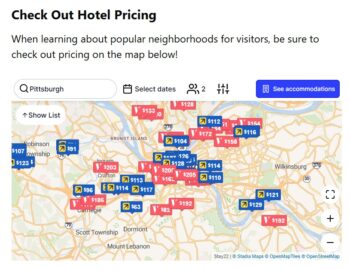How to Use ChatGPT as a Search Engine – Fight AI With AI
Published by Jeremy. Last Updated on June 23, 2025.
Disclaimer: This Week in Blogging uses demographic data, email opt-ins, and affiliate links to operate this site. Please review our Terms and Conditions and Privacy Policy.
If you're a content creator like us, odds are good that you don't like the idea of AI and LLMs training off of your content.
Join the club.
One subset of all this AI nonsense that has enraged website operators is how search engines are pushing AI-generated overviews, which take publishers' intellectual property, reword it, and deliver it to queries at the top of SERPs- often cutting the original creator out of clicks, views, and ultimately, revenue.
Well, I'm here to tell you, there is a way you can fight back, and it involves using your preferred AI to bypass their AI.
Yes, dear reader, you can seemingly use AI to crawl search engines, organize results in clickable top 10 format (often even better than they do!), and not trigger a single ad or stupid AI Overview in the process.
Turnabout, as they say, is fair play.
A New Way to Monetize – Join Stay22's Retail Beta Program
Published by Jeremy. Last Updated on June 17, 2025.
Disclaimer: This Week in Blogging uses demographic data, email opt-ins, and affiliate links to operate this site. Please review our Terms and Conditions and Privacy Policy.
Published by Jeremy. Last Updated on June 17, 2025.
Disclaimer: This post contains sponsored content. This Week in Blogging uses demographic data, email opt-ins, and affiliate links to operate this site. Please review our Terms and Conditions and Privacy Policy.
This article is sponsored by Stay22. As always, all opinions are our own.
Stay22 has been a leading company in travel affiliate marketing for many years now, with its vast number of partnerships and unique technology to help website owners earn more money.
In 2025, Stay22 is expanding beyond the travel sphere and adding a new retail partner within the Nova product line. To start, they're looking for bloggers and website publishers with a strong US-based audience to help beta test.
So, what is Retail Beta and how can you get in on it? We have all the details in this one!
The Hidden Costs of Free Products as a Content Creator
Published by Jeremy. Last Updated on June 16, 2025.
Disclaimer: This Week in Blogging uses demographic data, email opt-ins, and affiliate links to operate this site. Please review our Terms and Conditions and Privacy Policy.
“Hey Jeremy, we love your Insta. We're having an influencer night tomorrow and would love for you to come. We're giving attendees and a plus-one a free cocktail in exchange for a posted Reel and media we can use in our marketing. Will see you there?”
Absolutely not.
Oh, terrible brand comps. If I had $10 for every bad pitch I have received in my nearly 20 years of blogging, I would've retired a decade ago.
The truth of the matter is that a large arm of influencer marketing has become a race to see who can produce the most content in exchange for a nominal product and experience. While we certainly see instances where this model works, one point of discussion that is often overlooked is how that free product you're about to receive really isn't free. You have a great deal of costs that you'll incur no matter what that you may not be thinking about.
So let's talk about the hidden costs of taking a comp as a content creator!
5 Lessons Learned from Growing an AI Facebook Page
Published by Jeremy. Last Updated on May 19, 2025.
Disclaimer: This Week in Blogging uses demographic data, email opt-ins, and affiliate links to operate this site. Please review our Terms and Conditions and Privacy Policy.
AI has become the bane of content creators around the world for many reasons. From LLMs ripping off our content to AI accounts, pages, and tools being propped up by networks left and right, there really is a lot of bad uses of AI in the world these days.
I generally do not use AI for any of my blogs, except for perhaps doing some mundane tasks like brainstorming or figuring out a calculation when doing analytics. But I also recognize that AI is seemingly not going anywhere, and so if networks are propping up accounts on the engagement-at-all-costs model, I thought I'd create a project that was purely dedicated to using AI tools from the start- AI images, AI copy, AI generated ads, and even an AI generated logo.
My goal? To see what all I could learn about launching a new brand in the age of AI, if being a solely AI page helps or hurts, and, long-term, if I could get the page to become part of any social bonus programs to earn revenue.
While I'm still waiting on the last bit, I've had some lessons learned in the first few months of launching the site.
5 New Tools on Stay22 for Travel Affiliates
Published by Jeremy. Last Updated on April 28, 2025.
Disclaimer: This Week in Blogging uses demographic data, email opt-ins, and affiliate links to operate this site. Please review our Terms and Conditions and Privacy Policy.
Published by Jeremy. Last Updated on April 28, 2025.
Disclaimer: This post contains sponsored content. This Week in Blogging uses demographic data, email opt-ins, and affiliate links to operate this site. Please review our Terms and Conditions and Privacy Policy.
This article is sponsored by Stay22.
We've been fans of Stay22 for many years now, and take whatever opportunity we can to shout from the rooftops how much money they've made us in recent years (I just crossed over $27,000 in lifetime commissions with $700-$1,000+ per month- a massive increase from my previous earnings!).
We have seen a lot of new tools come out on Stay22 through early 2025, and if you have missed some of the announcements in our weekly newsletter, we thought we'd take a moment and share five of the newest products that we're digging on Stay22.
If you haven't signed up for Stay22 yet, get started today here, and read on to learn more about some new tools and products you may not have heard of!






